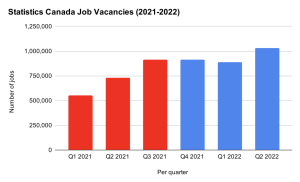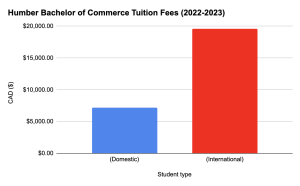Immigration Minister Sean Fraser announced that starting Nov. 15, 2022, the Government of Canada will allow full-time international students to work with no limit on hours for off-campus jobs. Previously, international student permits had a 20 hour per week limit during studies and no limit during breaks; this was to ensure students would focus on their studies.
“International students contribute to our country in so many ways. They enrich our communities, and play a crucial role in growing our economy,” Fraser said in a Tweet.
With Canada’s job vacancy rate at record highs, the government plans to use this pilot to help with labour shortages. In the second quarter of 2022, Statistics Canada revealed that employers across all sectors were actively seeking to fill nearly 1 million positions.
Betsy Kane is a lawyer at Capelle Kane Immigration and a member of the Canadian Immigration Lawyer Association (CILA). Kane says that this program could backfire on students.
“If they are working too much, that’s going to get in the way of them meeting the regulatory requirement to actively pursue their program. If they fail and can’t get the program done then their chances to secure an open work permit or post-graduate work permit following graduation is compromised,” said Kane.
Kane says international students that struggle financially are the most vulnerable.
“Members of the Canadian immigration lawyers association would be counselling international students to carefully determine whether they need and should work full-time because it could serve to eliminate the whole purpose of why they came to Canada in the first place,” said Kane.
Some international students want to work more to be able to pay for high tuition costs. For most programs, Humber and Guelph-Humber international students pay more than three times the amount domestic students pay. For comparison, tuition for a domestic Guelph-Humber student studying business full-time is $9,567.76 while international students pay $36,315.9.


Jaspreet Kaur is a second-year international student from India studying business management at Humber. Kaur says that she plans to extend her hours to 30 hours instead of 20. By working these extra hours Kaur is planning to help her parents, but worries about her academics.
“I can cover my expenses. That’s the main thing so I can support my parents, but it will no doubt increase my burden on studying because I will get less time to study,” said Kaur.
Although she has concerns about her studies, she thinks there will be a positive impact. Kaur said when the news broke out, many of her friends said they wanted to study in Canada.
“People are really crazy to come here and this news, it makes them even more excited to come here,” said Kaur.
Bindia Darshan is an occupational therapist and manager of the wellness education and programs at Humber College. In 2021 Humber College hosted a student success questionnaire with 41 per cent of 10,720 respondents saying they work over 16 hours a week. Darshan says that every student is different, but working over 20 hours does bring some wellness concerns.
“There’s only 24 hours in a day and we know that sleep affects our ability to be well, we know that we need to eat well and we need to exercise. So if you’re working more than 20 hours a week plus go to school full time that doesn’t really leave much time for you to practice, your sense of self-care and wellness,” said Darshan.
Maureen Gregorio is an international student from the Philippines in her third year in Humber’s media and communications program. Gregorio spends her time out of the classroom working part-time as a content creator for Ignite, Guelph-Humber and Humber’s student union.
“As much as I want to make the most out of that opportunity, I am so swamped with all the schoolwork right now. I also don’t want to neglect my studies and my responsibilities as a student as well,” said Gregorio.
With Gregorio’s current job at Ignite, she would have to find work off campus if she wanted more hours. This is because work-study positions through Ignite, Humber and Guelph-Humber will only allow students to work on campus 24 hours per week.
The pilot program will run from now to Dec. 31, 2023, and is only available for those who have applied for or hold a study permit by Oct. 7, 2022.